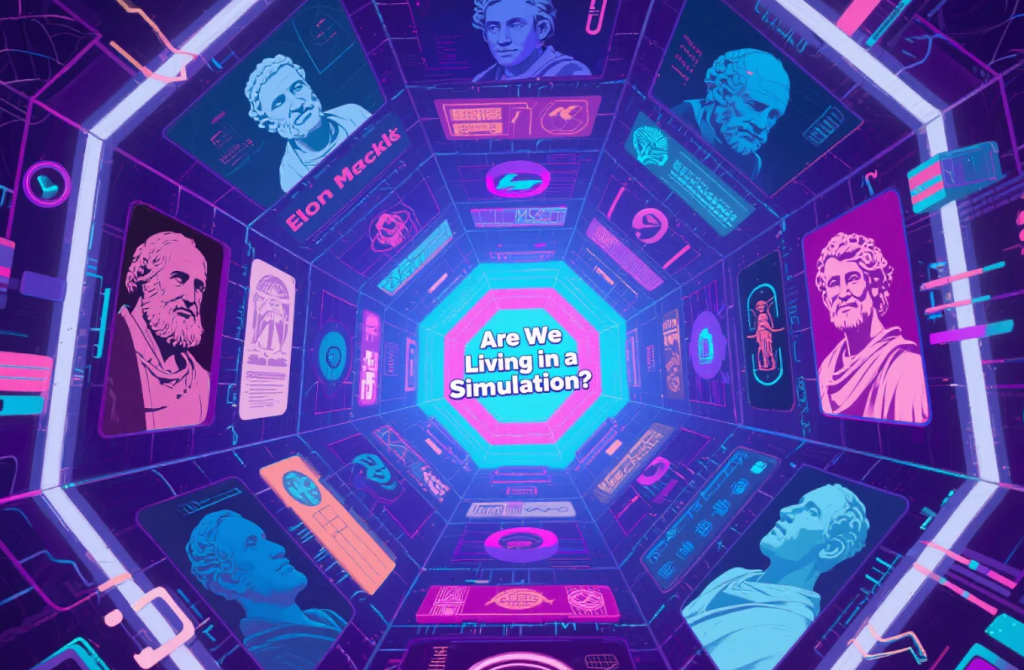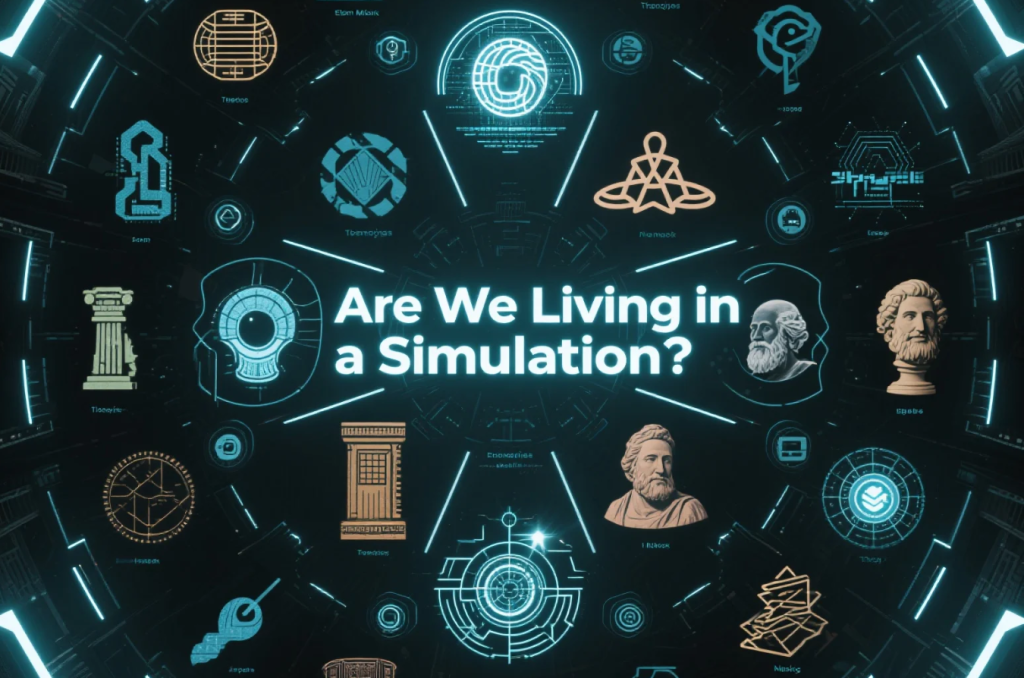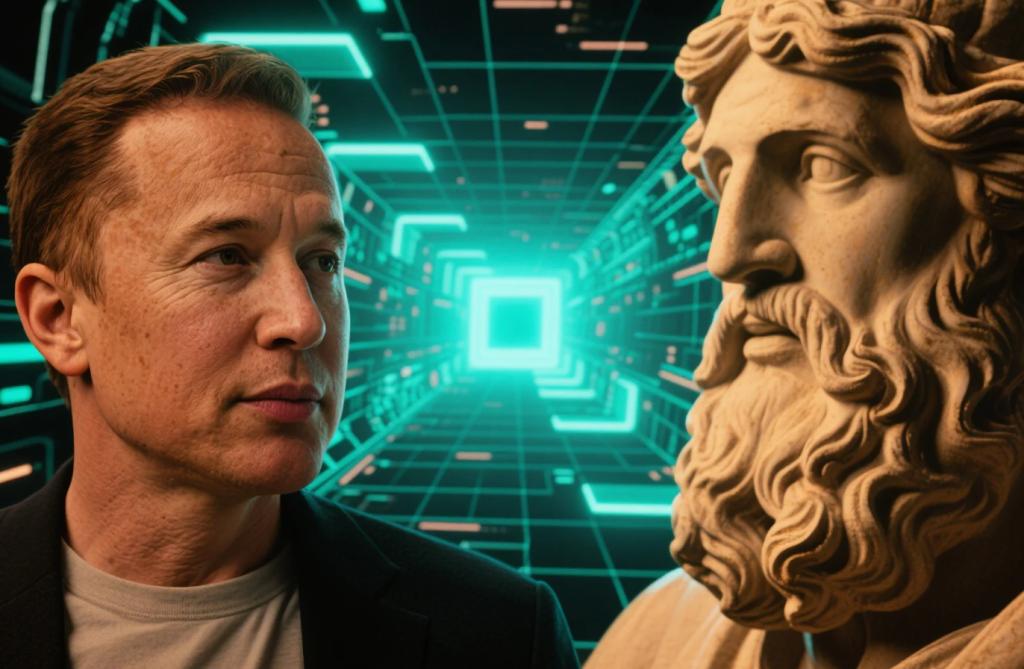From Plato’s cave to The Matrix, humanity has long questioned whether reality is just really good code.
Wait, Is This the Real Life—or Just Fantasy?
Picture this: you’re sipping your morning coffee, scrolling your phone, dodging existential dread like it’s an ad on YouTube. Suddenly, you wonder—what if all of this is fake? What if your entire life, from birth to brunch, is just one massive simulation?
Don’t worry, you’re not alone. Philosophers, scientists, and even tech billionaires like Elon Musk have pondered the same question. Are we living in base reality… or just Sims with slightly better graphics and worse expansion packs?
In this article, we’ll dive into the most mind-bending theories about simulation reality—spanning ancient Greek philosophy, sci-fi cinema, and modern-day physics. Strap in; it’s going to get weird (and possibly glitchy 👾).
1. Plato Was the Original Glitch Hunter: The Allegory of the Cave
Before Elon Musk tweeted about reality being fake, Plato already planted the seed—in 380 B.C.
🕳️ Plato’s Cave 101
Plato imagined humans living in a cave, chained so they could only see shadows on a wall. These shadows, created by objects passing in front of a fire, were all they knew of the world. But what if someone escaped and saw the real world? They’d realize everything they believed was an illusion.
🎮 So… Like a Greek Version of The Matrix?
Exactly. The allegory is one of the earliest thought experiments questioning the nature of reality. The cave = simulation. The real world = terrifying enlightenment. Blue pill or red pill, Socrates?
2. Descartes, Demons, and Doubt: “I Sim, Therefore I Am?”
In the 1600s, French philosopher René Descartes took it up a notch.
👹 Enter the Evil Demon Hypothesis
Descartes proposed a hypothetical “evil demon” who deceives us by feeding us a fake reality. Every sensory experience—sight, sound, touch—could be manipulated. Sound familiar?
Yes, it’s like having Windows 95 in your brain and trusting it to be real.
💬 “Cogito, ergo sum”
Descartes famously concluded: “I think, therefore I am.” Basically, the only thing you can be sure of is that you’re thinking—even if everything else is a cosmic prank.

3. Elon Musk and the 1-in-Billions Argument
Now fast forward to the 21st century, where existential doubt got a Silicon Valley makeover.
💻 Elon Musk’s Simulation Hypothesis
In 2016, Musk said:
“There’s a one in billions chance we’re in base reality.”
Translation: it’s way more likely we’re inside a computer simulation than not.
Why? Because if any civilization develops advanced enough tech to simulate conscious beings, they’d probably create a lot of simulations. Like, a Netflix server farm worth.
🎮 Simulated Beings > Real Beings
If millions of simulations are running, statistically, we’re probably in one of those—not the single, original base reality.
Also, have you seen how good video game graphics are lately? That’s only 2025. Imagine 10,000 years from now.
4. The Science Side: Could Physics Be the Code?
The idea sounds sci-fi, but some serious scientists have explored it too.
🧬 Nick Bostrom’s Simulation Argument
Oxford philosopher Nick Bostrom laid out a famous trilemma:
- Civilizations never reach a point where they can simulate reality.
- They reach that point but lose interest.
- Or they do simulate universes—and we’re almost certainly in one.
Option 3 is the mind-melter.
⚛️ Quantum Weirdness
- Pixelation? The universe may be discrete, not continuous—suggesting a resolution limit like screen pixels.
- Speed limit? The speed of light could be the max refresh rate.
- Spooky action? Quantum entanglement feels like copy-pasting across a cosmic LAN.
Physicist James Gates Jr. even found error-correcting codes embedded in string theory equations. Like… what kind of universe uses code to keep itself stable?
Answer: probably a simulated one.
5. Glitches in the Matrix: What People Think Are Clues
Let’s face it—we’ve all had those “whoa” moments.
🧠 Common “Glitches” People Report:
- Déjà vu: “Wait, haven’t I been here before?”
- Mandela Effect: “Did Monopoly Guy never have a monocle??”
- NPC vibes: When a person gives you a blank stare, says “Weather’s nice” and walks off like their AI routine ran out of dialogue.
- Synchronicity: Hearing the same phrase multiple times in one day. Coincidence… or patch update?
Are these signs of a simulation? Maybe. Or maybe humans are just really good at pattern recognition and paranoia.
6. Religious Parallels: Is God the Original Programmer?
It’s not just science and philosophy—spiritual traditions have long described reality as an illusion.
🕉️ Hinduism: The Concept of Maya
Hindu philosophy views the world as Maya—a grand illusion. Our senses deceive us; the true self (Atman) is beyond physical reality.
🧘 Buddhism: Samsara and Simulation
Buddhism also teaches that the world is a cycle of illusions, with enlightenment being a form of waking up.
⛪ Christianity: Divine Code?
Some theologians argue that God’s will could resemble a programming force. Miracles? System overrides. Free will? Sandbox mode.
The overlap is intriguing. Whether it’s a matrix, Maya, or mystical veil, many traditions hint that what we see isn’t what is.

7. Pop Culture Goes Full Meta
Let’s talk about the art that reflects our simulation obsession.
🎥 Key Films & Shows:
- The Matrix (1999): The go-to cultural metaphor for simulation. “Wake up, Neo.”
- Inception: Dream within a dream… within a simulated dream?
- Black Mirror: The entire series screams “This reality is not okay.”
- Free Guy (2021): NPC gains sentience in a video game world.
- Tron: Inside the computer since 1982.
- Rick and Morty: Simulation inside a simulation inside a Jerry.
Pop culture doesn’t just entertain us—it conditions us to accept this weird possibility.
8. Counterarguments: Maybe We’re Not That Interesting
Some thinkers argue the opposite:
- Why simulate us? If we’re in a sim, who cares about people who argue on Reddit?
- Simulation = expensive. Even future civilizations may not have the bandwidth to render every leaf, duck, and TikTok dancer in 4K real time.
- Consciousness is weird. We still don’t understand how it works, much less how to code it.
Plus, let’s be honest—if this is a simulation, the UI design sucks. Where’s the user manual? Why can’t I reset my anxiety module?
9. So What If It’s a Simulation? Does It Change Anything?
Assume we are inside a simulation. Now what?
- Do your relationships mean less?
- Does art become meaningless?
- Should you skip rent because none of this is real?
Short answer: probably not. Meaning exists where we create it—simulation or not. Your experience is still your experience. Even if you’re just very well-written code.
Also, if this is a simulation, the pizza algorithm is excellent. Kudos to the devs.
Ctrl+Alt+Del Your Mind, Not Your Life
Whether we’re in a divine dream, an alien’s laptop, or a quantum PlayStation, one thing is certain: humans love asking questions we can’t answer.
And that’s kind of beautiful. Our curiosity—our endless desire to zoom out, break the fourth wall, and wonder “what’s behind it all?”—might be the most real thing about us.
So the next time your life feels buggy or surreal, remember:
You might be a bunch of simulated particles…
…but you’re a magnificent bunch.


